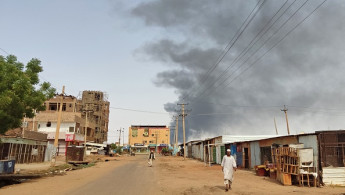No respite for Sudan civilians two months into brutal war as military bombs El Obeid
Army warplanes bombed the Sudanese city of El Obeid Wednesday, as the country prepared to mark two months since a power struggle between rival generals plunged the country into devastating conflict.
Since April 15, the regular army headed by Abdel Fattah al-Burhan and the paramilitary Rapid Support Forces commanded by his former deputy Mohamed Hamdan Daglo have been locked in urban combat that has left whole neighbourhoods of the capital Khartoum unrecognisable.
The fighting quickly spread to the provinces, particularly the flashpoint western region of Darfur, and has now killed at least 1,800 people, according to the Armed Conflict Location and Event Data Project (ACLED).
On Wednesday, the regular army carried out "air strikes for the first time in El Obeid," the capital of North Kordofan state, 350 kilometres (220 miles) south of the capital, which has been "surrounded by the RSF since the war began," witnesses told AFP.
#السودان:
— السياق (@alsyaaq) June 14, 2023
»» قصف جوي يستهدف مواقع لـ #الدعم_السريع في مدينة الأبيض بشمال #كردفان
»» طيران #الجيش_السوداني قصف 4 مواقع للدعم السريع في #جبل_عيسى وجبل كردفان#السياق #Sudan pic.twitter.com/au6yDsApOA
Nationwide, some 2.2 million people have fled their homes, more than one million of them escaping Khartoum, according to the International Organisation for Migration.
Of those, more than 528,000 have sought refuge in neighbouring countries, according to the UN agency.
Those that remain have run out of "food, water and medicine," Khartoum resident Ahmed Taha told AFP.
"We have nothing left. The entire country has been completely devastated. Everywhere you look, you'll see where bombs have fallen and bullets have struck. Every inch of Sudan is a disaster area."
US and Saudi mediation efforts are at a standstill after the collapse of multiple ceasefires in the face of flagrant violations by both sides.
"We think we've given them every shot," a senior US State Department official said on Tuesday.
Aid agencies have pleaded for the opening of humanitarian corridors to allow assistance in and fleeing civilians out but to no avail.
Entire districts of Khartoum no longer have running water, mains electricity is only available for a few hours a week and most hospitals in combat zones are not functioning.
A record 25 million people - more than half the population - are in need of aid, according to the UN.
"We have been suffering and suffering and suffering the scourge of this war for two months," said Khartoum resident Soha Abdulrahman.





 Follow the Middle East's top stories in English at The New Arab on Google News
Follow the Middle East's top stories in English at The New Arab on Google News


